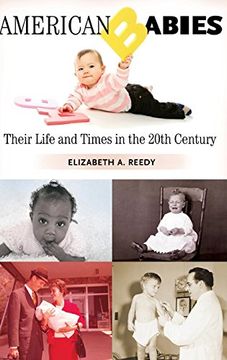American Babies: Their Life and Times in the 20Th Century (Growing up: History of Children and Youth) (en Inglés)
Reseña del libro "American Babies: Their Life and Times in the 20Th Century (Growing up: History of Children and Youth) (en Inglés)"
The focus of this book is the journey babies have made over the past century. The rise of the middle class in America dictated major changes in the ways babies were fed, cared for, and raised. Social programs focused on improving water and sanitation programs for all, which led directly to decreased infection among infants and improved morbidity and mortality rates. Other programs also focused attention on babies. Advances in medicine allowed infants to be immunized against once-deadly and disabling diseases and to survive congenital defects, premature birth, and infectious disease. Physicians helped infertile couples conceive and carry a baby to term. Prenatal care helped mothers give birth to a healthy baby. Early intervention services gave infants an advantage as they faced growing up in the modern era. Today, most American babies are better off than they were in 1901. Overall they are bigger, healthier, and much more likely to survive the first year. But challenges remain. By reviewing the events of the past century, Reedy hopes we can make even more of a difference in the lives of American babies in the century to come.In 1900, most babies were born at home. Infant mortality was high and most families could expect to lose one or more of their babies within the first year of life. A family was expected to have babies, and they were certainly wanted in most situations, however, they did not generally receive the attention they do today. In the early years of the 21st century, the birth of a baby is a time of joy for most parents and extended families. Birth occurs most often in a hospital delivery room with the father and sometimes other family members present. While the infant mortality rate in the United States still lags behind many other developed countries, it has significantly improved over the past century, and infant death is not a family expectation.The main focus of this book is the journey babies have made over the past century. The rise of the middle class in America dictated major changes in the ways babies were fed, cared for, and raised. No longer a financial necessity as in an agrarian society, babies became a symbol of middle class prosperity and parents basked in the reflected glow. Social programs, authorized and regulated by federal and state government, became a reality. Progressive Era reformers focused on improving water and sanitation programs for all, which led directly to decreased infection among infants and improved the dismal morbidity and mortality rates prevalent among all social classes. Other programs, such as the Shepard-Towner Act, the Social Security Act, and Lyndon Johnson's Great Society initiatives also focused attention on babies. Advances in medicine allowed infants to be immunized against once-deadly and disabling diseases and to survive congenital defects, premature birth, and infectious disease. Physicians discovered the means to help infertile couples conceive and carry a baby to term. Prenatal care helped mothers prepare for the birth of a healthy baby. Early intervention services by educators, social workers, and others gave infants an advantage as they faced growing up in the modern era.At the beginning of the 21st century, most American babies are better off than they were in 1901. Overall they are bigger, healthier, and much more likely to survive the first year. But challenges remain. By reviewing the events of the past century, Reedy hopes we can make even more of a difference in the lives of American babies in the century to come.

